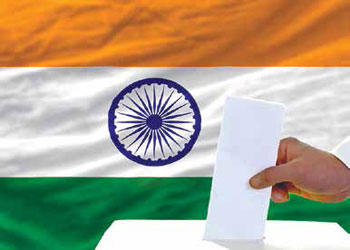The next five years will truly determine if India has the gumption and the will to take tough decisions and implement ideas with wisdom and alacrity

Every election in India becomes bigger and better managed and in spite of a few bitter losers crying foul against unfair tactics or faulty counting machines, there is no doubt that this is an exercise that is far superior to a Bangladesh or Pakistan where accusations of mass rigging have never been fully addressed. Even in the US, the memory of the Florida fiasco in one memorable Presidential election still rankles and the electoral college system seems to throw up candidates who are not necessarily what the intelligent voter would like to see in High Office.
Our track record in India has been better with the "janta janardhan" managing to teach lessons to the arrogant and bring in change whenever it is needed and sometimes even when it does not seem warranted. Growing up in rural Bihar in the sixties, I still recall with amusement many school children casting votes giving names of people who were on the electoral rolls but never showed up to vote, possibly because they were not even alive anymore. In modern times, with voter identity cards and all kinds of identity management processes, one hears more of genuine citizens denied the opportunity to exercise their franchise than any instances of fraudulent voting. Hence in most cases, one can rarely fault the outcome of an election in this country even if the means deployed by some of our politicians to get those votes may not be appreciated by all.
But what is it about the Indian elections that seem to bring out the worst in the behavioural patterns of the elite? A recent joke about why South Mumbai registers a low voter turnout (no valet parking, the driver didn’t show up, servants are in the same line as their masters etc) may have been concocted in jest but are close enough to the truth. But what excuse can we provide for the city of Pune, the “Oxford of the East” and the fastest growing IT city when it regularly reports a barely fifty per cent of eligible voters exercising their franchise? Speaking to a few young tech employees a week before the elections, it was apparent that while they agreed with the need to vote as a principle, they had no empathy at all for the candidates in the fray since there was no belief that any change would happen in the city if any of the candidates on the ballot did get elected. Possibly a case for asking urban India to vote for a Prime Ministerial candidate rather than a local MP.
Also, a case for the candidates doing a little more to engage with the educated and well employed voter community rather than just focusing on the larger demographic segment and wooing them for votes. Having lived in Pune for nearly two decades now, I can certainly recall one former MP who did his bit to reach out to all of us and one of the candidates this time has also attempted to play a role in city improvement, but more bridges need to be built with the intelligentsia to get the voting percentages up in the city
Our track record in India has been better with the “janta janardhan” managing to teach lessons to the arrogant and bring in change whenever it is needed and sometimes even when it does not seem warranted
On the topic of engagement with politicians, one can also fault the youth and even some of the more mature citizens of the city who let their cynicism color their view of the politicians, the bureaucracy and the municipal corporation officials who do their best against gigantic odds to make our cities and towns happy places, focused on growth and development. Our own experience at Pune City Connect over the last five years with two Pune Municipal Corporation Commissioners, three Mayors and many Corporators and department heads in the corporation has been excellent, thanks largely to the willingness of our team to engage and work collaboratively which has found easy reciprocation from the powers that be in the Government. Is there a case then for our MPs and MLAs too to engage with the social sector and play a formal advisory role in city administration so that they become more visible to the inhabitants of the city?
Be that as it may, there is no doubt that the whole country will tune in on the 23rd of May to watch the outcome of these elections and the selection of the person who will preside over the destinies of our country for the next five years. As a country, we are at cross-roads. Much has been done in the form of infrastructure strengthening but we have many promises to make and keep to improve education at all levels in the country, power up manufacturing and agriculture, boost entrepreneurship and create ten million jobs every year to keep our ambitious and expectant youth happy. The next five years will truly determine if India has the gumption and the will to take tough decisions and implement ideas with wisdom and alacrity. We are approaching our tryst with seventy-five years of independence and we cannot afford to falter if the next generation has to truly see our country take its place amongst the ranks of the developed and prosperous nations of the world!
By Ganesh Natarajan